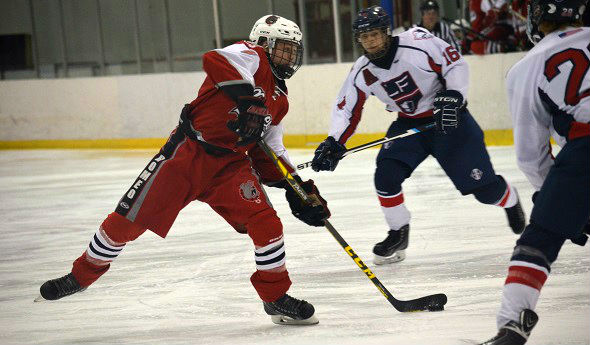
Romeo Icers' Goal: Make More History
By
Tom Markowski
Special for Second Half
January 15, 2016
ROMEO – It’s often been said that if a school has a successful football season, that excitement generated in the fall will carry over to the other athletic programs.
 Although Romeo hockey coach Nick Badder doesn’t have any football players who were a part of the school’s Division 1 championship win in November, he’s hoping that success will breed success on the ice.
Although Romeo hockey coach Nick Badder doesn’t have any football players who were a part of the school’s Division 1 championship win in November, he’s hoping that success will breed success on the ice.
Romeo defeated Detroit Cass Tech, 41-27, at Ford Field to capture the school’s first football MHSAA title. And the hockey team is off to the best start in school history, as the Bulldogs are 12-0 and the team to beat in the Macomb Area Conference Red.
When asked if there is indeed a carryover effect, Badder initially discounted it – and then reassessed the significance.
“I wouldn’t say so,” he said at first. “It was cool for the guys to go down there (to Ford Field) and win.
“That’s our goal. It was a motivator in the beginning. It was good for (our players) to see. The school spirit was lifted, and we want to get there, too. We want the same thing.”
Should Romeo win the Division 2 hockey title this March, it would be the first time a Macomb County program won an MHSAA title in hockey since Fraser won Class A in 1983.
It’s been a steady rise for this program. Romeo lost to Warren DeLaSalle, 3-2, in a Regional Final in 2014, and last season the Bulldogs reached the Quarterfinals for the first time before losing to Grosse Pointe South, 8-2.
Badder, 26, was an assistant in the program in 2014 and took over as head coach last season.
 He said the loss to South was an important lesson to learn, for him and his players.
He said the loss to South was an important lesson to learn, for him and his players.
“We didn’t have big-game experience,” he said. “We didn’t handle the situation well. That’s what we’ve been trying to do this year. We don’t want those 9-5 type of games.”
The first order of business was to tighten up the defense. The fact that Badder returned both goaltenders from last season was a good starting point. Junior Nolan Kare has a .883 save percentage and has started every game. Sophomore Grant Williams is his backup.
Kare is not your typical goalie. He’s not afraid to speak his mind whether it’s on the ice or in the locker room.
“He really gets into the game,” Badder said. “He’s a hard worker and a great kid.”
The biggest improvement from last season’s team to this one is depth. Romeo’s first line returns intact, and center Nick Blankenburg is the catalyst. The team captain, Blankenburg doesn’t get outworked. Highly skilled and packing plenty of power despite his smaller size (5-foot-7, 140 pounds), Blankenburg sets the tone and has 19 goals and nine assists.
“Everyone on the team respects him,” Badder said. “And he’s got a bomb for a shot.”
Fellow senior Logan Jenuwine plays left wing and, just like last season, is the team’s top point-getter. He had 90 last season and has 18 goals and 20 assists in 12 games this winter.
At right wing is junior Brett Lanski. He trails only his line mates in points with seven goals and 14 assists.
 Romeo’s objective it to jump the other team quickly, grab an early lead and let its depth wear down the opposition.
Romeo’s objective it to jump the other team quickly, grab an early lead and let its depth wear down the opposition.
“That’s what we do,” Badder said. “They’re a high-flying line. We put them together late last January, and they’ve had a lot of success. We tried something different to start (this) season, but we went back to those three and that’s where they’ll stay.”
Badder lost seven seniors to graduation but said the juniors, who bring travel-team experience, have filled the gaps.
“They all can play,” Badder said. “There isn’t a guy out there who doesn’t belong. If we had an injury (last season) it would have been crippling. Not this year. Even the top guys have nights off. Someone has to pick up the slack.”
Shoring up the defense has been seniors Steven Morris and Logan Ganfield. Badder said these defensemen are his most improved players.
Parts of that strong junior class are center Jake Petry and winger Frank Ruffino.
The breakthrough the team experienced last season, capturing a Regional title, set the groundwork for this winter. Winning breeds confidence, and the Bulldogs are riding that wave.
“Our practices have been tight,” Badder said. “There’s no fooling around.
“I learned a lot last year. Everything I’ve done are the things I would want when I played.”
 Tom Markowski is a columnist and directs website coverage for the State Champs! Sports Network. He previously covered primarily high school sports for the The Detroit News from 1984-2014, focusing on the Detroit area and contributing to statewide coverage of football and basketball. Contact him at [email protected] with story ideas for Oakland, Macomb and Wayne counties.
Tom Markowski is a columnist and directs website coverage for the State Champs! Sports Network. He previously covered primarily high school sports for the The Detroit News from 1984-2014, focusing on the Detroit area and contributing to statewide coverage of football and basketball. Contact him at [email protected] with story ideas for Oakland, Macomb and Wayne counties.
PHOTOS: (Top) Romeo's Zach Peters looks for an opening against Livonia Franklin. (Middle) Romeo coach Nick Badder, center Nick Blankenburg and goaltender Nolan Kare. (Below) Blankenburg (26), Jake Petri (24), Steven Morris (36) and Kare stand strong as part of a solid defense. (Photos courtesy of Donna Peters.)
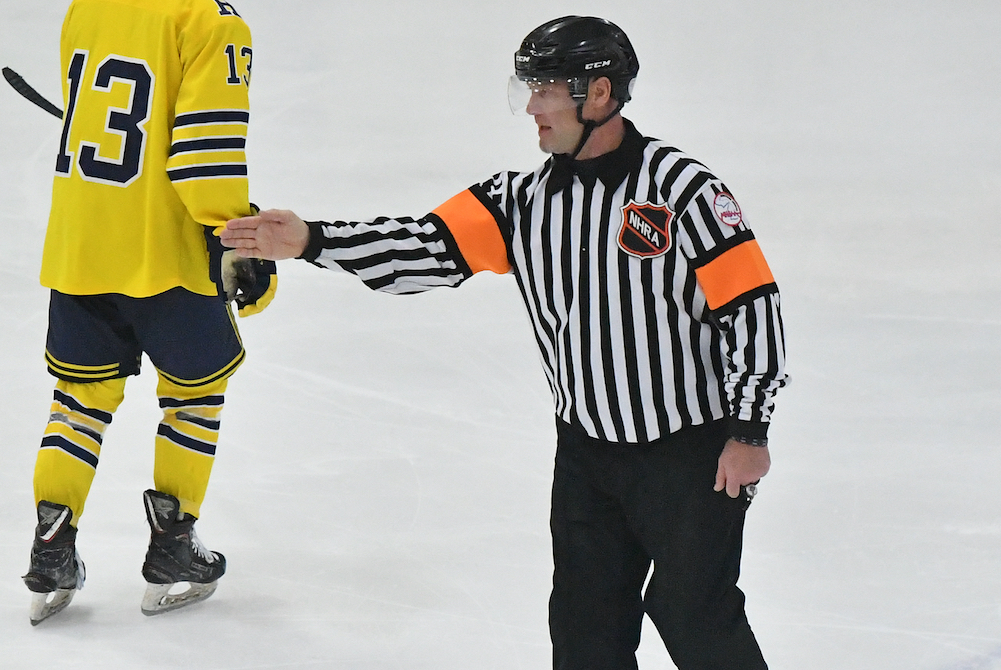
Retired NHL-er Back on Ice to Answer Call - By Making Them
By
Rob Kaminski
MHSAA benchmarks editor
March 16, 2023
The most accomplished skater on the ice during Friday’s triple-overtime MHSAA Division 1 Semifinal hockey thriller between Hartland and Brighton was not wearing the school colors of either team.
In front of a packed house at Plymouth’s USA Hockey Arena, referee Bryan Smolinski was in stripes, just like the rest of his officiating crew.
In his former life, he pulled on plenty of sweaters before lacing up the skates. That happens when one logs more than 1,000 games, tallies nearly 300 goals (274) and close to 400 assists (377) with eight teams spanning a 15-year playing career in the National Hockey League.
So, how did the 52-year-old former star player find himself on the ice last weekend as one of the referees for the pinnacle weekend of this high school season? Good question, even for the man known as “Smoke” during his playing days.
“I was working in youth development programs a few years back and reached out to some Michigan guys I had connections with about other ways to help the game,” Smolinski said. “I called Kevin May just to chat and asked, ‘Hey, how’s your reffing going?’ He said, ‘You know, we’re down a little bit,’ then said, ‘Why don’t you do it?’ I said, ‘Not a chance,’” Smolinski laughed.
Never Say Never
May persisted, imploring his friend to skate with him during a Fall league at Cranbrook in Bloomfield Hills. After eight weeks, once a week, Smolinski had a revelation.
“I’m like, ‘I’m kind of diggin’ this,’” Smolinski said “So, I did all the testing, and the educational part of it, and I really enjoyed it. I got with Danny (DiCristofaro) and his group, and he put me in as much as he could, and I really started to get my feet wet.”
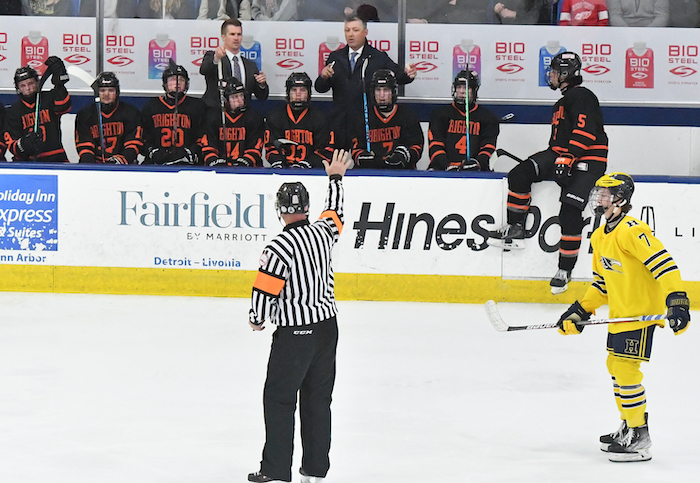 DiCristofaro is the assigner and referee-in-chief for the MHSAA’s Northeast Hockey Referees Association, and he has seen Smolinski’s growth first-hand.
DiCristofaro is the assigner and referee-in-chief for the MHSAA’s Northeast Hockey Referees Association, and he has seen Smolinski’s growth first-hand.
“Obviously he’s got great instincts and a feel for the game, along with a wealth of experience, all of which has allowed him to climb the ladder quickly,” said DiCristofaro. “It’s been a joy to watch his growth as an official.”
Fast forward to last Friday, and there were Smolinski and May sharing duties as referees during the MHSAA Semifinal with linesmen Michael Andrews and Thomas Robbins.
In between, there has been a learning curve that still continues, but the jump to officiating was not quite as daunting as his introduction to the NHL.
“I was scared to death. My first game was against Mario Lemieux. I’m in the old Boston Garden and now I’m playing against these guys and it’s their job, and they’re out there trying to make a living,” Smolinski recalled.
The emotions were not running nearly as frenzied for his first game as an MHSAA official, obviously, yet respect came in a different form.
“I couldn’t pick the puck up, I was breathing heavily; it was Kevin and me doing a two-man game in Brighton,” Smolinski recalled. “There were a few high-end kids playing, and I’m thinking, ‘I’m dying here.’ You know, there’s no training for that first time.”
What that experience did, however, was revitalize Smolinski in a new way. His playing career is well documented, not only in the NHL, but around Michigan. He enjoyed an honor-laden career at Michigan State University from 1989-93 before joining the Boston Bruins (who had drafted him three years earlier) at the end of the ’93 NHL campaign. Even after his final season, with Montreal in 2007-08, he stayed in the game via men’s leagues, or coaching his son, Max.
Smolinski and his wife, Julie, have three daughters: Ashtyn (22), Jojo (16) and Rylen (12), along with Max, whom dad coached for seven years including during a national championship run with a Little Caesars U15 team in 2019. Max, 19, is now playing collegiately at Rensselaer Polytechnic Institute.
So, for Smolinski, officiating offers a new chapter.
“Reffing brought back ... I wouldn’t say love of the game, because that’s always been there; it’s a different side of enjoying the game now. I have no horse in the race, my son’s off to college, my daughters are doing their thing; I wanted to find something new in the game,” Smolinski said. “I’ve coached, and I don’t want to do that. I found this, and I’ve stuck with it.”
Old College Ties
One of the great benefits of athletics at any level are the friendships made. For two kids who met in their first years on the MSU campus and forged a bond that lasts to this day, it’s amazing how their careers reached the pinnacle and have now come full circle.
Wes McCauley, an MSU teammate, is one of Smolinski’s best friends. After numerous years in the minor leagues, McCauley, like his friend, made it to the NHL. But McCauley made it as an official, working his first NHL game in 2003, when Smolinski was nearing the end of his playing career.
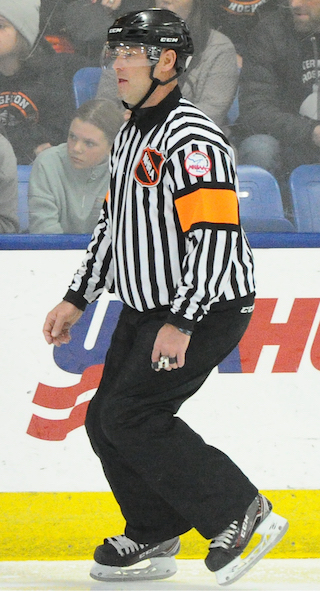 Their games lined up on just a few occasions in the NHL, and the two lobbied hard to have McCauley work Smolinski’s 1,000th career game in his final season with the Canadiens in 2007-08. The request, sadly, was denied by the league.
Their games lined up on just a few occasions in the NHL, and the two lobbied hard to have McCauley work Smolinski’s 1,000th career game in his final season with the Canadiens in 2007-08. The request, sadly, was denied by the league.
On the rare occasions when the friends did share the same ice, less than a handful by Smolinski’s count, it was McCauley who was forced to rebuff any attempts at fraternization. It’s just part of an official’s edict.
“For both of us, it was amazing; it was just great,” Smolinski said. “I’d say, ‘Hey man what’s up?’ and he says, ‘Can’t talk.’ I’m like, ‘What do you mean, we talk all the time.’ Again, he’s like, ‘Can’t talk, get away from me.’ You know, it was just business.”
McCauley then reached the 1,000-game plateau himself in 2018 and is still going strong as a regular selection for playoff duties with nine Stanley Cup Finals assignments, including last year.
So, it should have been natural for Smolinski to go to his old friend immediately for officiating pointers once he joined the ranks, right? Well, maybe not immediately.
“I talk to Wes all the time, but I actually hid it from him right out of the gate because I didn’t want to take his razzing. Eventually it got out, and he was loving it. He started sending me whistles and visors and pants,” Smolinski said, grinning. “And none of it fit, you know, because I’m older and fatter, and he’s so damn skinny. So, I still had to go out and get all new gear.”
Both Sides Now
Having been to the top of his profession, now moving to the other side of that same mountain that his friend McCauley scaled, the respect has grown for those blowing the whistle.
“The preparation for officiating is much more mental,” Smolinski said. “Way more rules oriented. You’re always trying to get away with things that you can as a player; now you have to police that.”
Smolinski has a distinct advantage.
“I know everything they’re trying to do because I’ve done it. I know where you’re going with the puck, I know what kind of breakout you’re trying to do,” Smolinski said. “I have all the instincts, now I just try to stay out of the way and not ruin their game. The most fun is watching the game develop and the ups and downs. For me to be out there and enjoy it with them, that’s the fun part.”
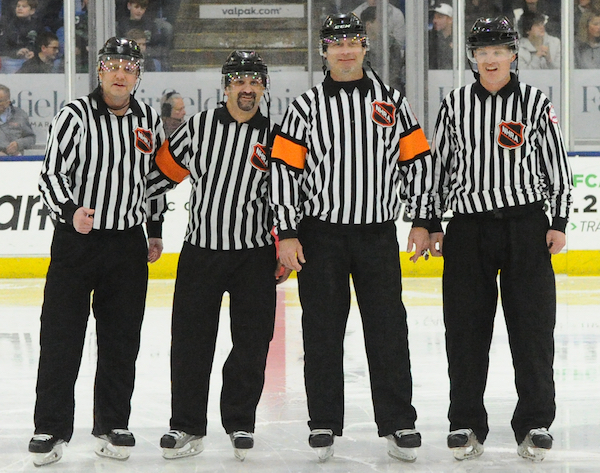 Those who have played hockey at any level have a built-in advantage should they consider the officiating avocation: the ability to skate. Unlike officiating in any other sport, skating is a prerequisite. This makes the pool limited, and almost solely composed of former players. Smolinski offers this advice.
Those who have played hockey at any level have a built-in advantage should they consider the officiating avocation: the ability to skate. Unlike officiating in any other sport, skating is a prerequisite. This makes the pool limited, and almost solely composed of former players. Smolinski offers this advice.
“I prefer sticking with high school because I think there’s more decorum, more administrative structure. Kids are playing for their schools, there’s loyalty there,” said Smolinski. “And there is more accountability. People need report to athletic directors and supervisors. Other levels can be more loosely governed, or a bit more maverick in nature. Moms and dads get involved more, coaches maybe know a little less,” said Smolinski.
He has, in fact, worked a handful of non-school games, and there’s a stark difference.
“I wanted to see what was going on, and I see it first-hand,” Smolinski said. “There are some crazy people and parents out there, and these guys are getting absolutely tortured. I’ve been tortured. There has to be a level of respect for what officials do. I think schools can rein that in a little more. All the guys I’ve met give up a lot of time and work hard because they love to do it and love the game.”
All sports need an assist from school administration and from those who once played the games to keep the officials recruitment moving in the right direction. People like Smolinski can help.
“He clearly doesn’t need to do this, and that’s what makes it so fantastic,” DiCristofaro said. “We need more people who have played – at any level – to do what he’s done and stay in the game as officials.”
Smolinski continues to promote the game in other ways as well. Currently, he is involved in the NHL’s Learn To Play initiative, which aims to inspire youth and welcome more families into the hockey community.
“We work hand-in-hand with the NHL Players Association for player development and industry growth,” Smolinski said. “Ages 5 to 9 are introduced to hockey, get head-to-toe gear and instruction, and meet some former players.”
The idea is to have fun first, which can translate into years and maybe even a lifetime in the sport. It’s a lifetime that has given Smolinski so much and continues to do so as he watches it unfold for others from his new vantage point.
PHOTOS (Top) MHSAA official Bryan Smolinski signals during Friday's Division 1 Semifinal between Brighton and Hartland. (2) Smolinski, a retired NHL standout, communicates with the Bulldogs' bench. (3) Smolinski keeps watch during game play. (4) Smolinski, third from left, with his crew: Michael Andrews, Kevin May and Thomas Robbins.

